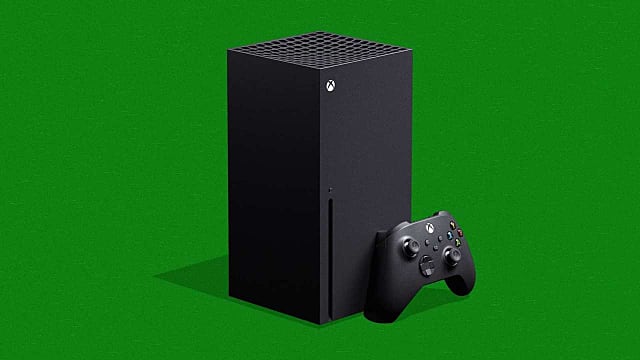If you lived through the 2010s, you witnessed new, powerful console launches, new developers knocking it out of the park, and new, exciting tech releases from the ill-fated Kinect to the still burgeoning VR field.
All of that and more led to an unforgettable 10 years in gaming that rivaled much of what came before. Don’t believe me? Let’s take a look back at the industry’s defining achievements over the past 10 years.
The Early 2010s
Certain moments will live forever. Lady Gaga’s meat outfit. Rebecca Black’s Friday. Kony 2012. The color of that stupid dress. Marriage equality. “But her emails.” Leo finally getting that damn Oscar.
For me, the decade began in earnest when I put GLaDOS into a potato in Portal 2. The combination of humor and disturbing horror sold it as much as the game’s top-notch voice acting and rock solid gameplay. That overall package had me sitting in awe, thinking: “Did modern video games just become amazing right this second?”
Aside from the hilarious legacy of Portal’s sequel (which itself will never be a follow-up since Valve sadly can’t count to three), the 2010s kicked off in earnest with notable returns from major series featuring big changes. Mass Effect 2 ditched the extraneous RPG elements and somehow came out better for it; Dead Space 2 ramped up the horror and gore of the first game; and, of course, Starcraft 2: Wings Of Liberty arrived with a makeover and revamped multiplayer.
The early 2010s proudly brought the gaming universe a re-tooled horde mode in Gears of War 3, and it’s one that stood the test of time. Aside from still holding the title of “one of the least toxic cooperative multiplayer modes” ever made, horde in Gears of War 3 remains the gold standard of multiplayer. Horde is one of the primary reasons why fans return to the Gears series even after the IP switched developers.
While those big-name AAA franchises made their marks, Minecraft became a phenomenon. Mojang’s smash hit created an enduring legacy that can’t be denied, even if the survival/open-world LEGO mashup has been endlessly emulated. Somehow the pop phenomenon still has hundreds of millions of active players, showing Mojang’s vision wasn’t just a fluke.
Between an insane number of skins, seeds, maps, and mods, Minecraft has to be one of the most expansive gaming experiences of all time, and it will probably still be up and running long after we are all dead and gone. As we move into the next decade, we’re preparing for Minecraft Dungeons, which could possibly be a game we’ll still be talking about in 10 years. Who knows?
OK, maybe it wouldn’t have been the worst thing if we didn’t know about this guy…
Another low-key title that had a bigger impact than many realize — though not Minecraft big — came in the horror genre.
Amnesia: The Dark Descent kicked off the “defenseless” horror subgenre that has seen the likes of Outlast, Layers of Fear, and Alien: Isolation follow in its footsteps. Although the Amnesia series is now quaint when compared to what came after it, it brought the horror genre to the masses. Why? Because big-name streamers loved it.
Reaction videos to Amnesia’s scarier scenes caught on like wildfire, and it’s partly to thank for the sudden spike in video game streaming personalities in the early part of the decade. Without Amnesia, it’s possible that the likes of PewDiePie and Markiplier might remain relatively unknown.
It is an absolute tragedy that this didn’t catch on.
Despite all of the unexpected successes, there were some “sure things” that ended up nosediving in the early part of the decade. Nintendo — normally a pillar of stability — saw the Wii U ultimately flop, even though the hardware itself had some fantastic applications.
If you haven’t experienced Rayman Legends local multiplayer using both the Wii U pad and your television screen, then you missed out on a critical piece of amazing gaming history.
While the Wii U has been consigned to the dust bin, other parts of the early 2010 gaming landscape caught on like wildfire and still haven’t gone out. Though I point blank hated Skyrim, credit must be given where it’s due. Bethesda captured the imagination of a generation with that particular Elder Scrolls entry, and Skyrim managed to remain popular enough to see re-release some dozen or so times across multiple consoles throughout the decade.
Without question, Skyrim played a large role in the success of the 2010 console cycle, but it had an even bigger impact on the PC landscape. Simply put, Skyrim is the king of mods, and has born an entire generation of modders that have created some truly fantastic experiences.
To date, Skyrim has more than 56,000 downloads available on Nexus Mods. Yeah, a lot of them are nude mods, but between the total conversion mods and extremely clever gameplay tweaks, Skyrim can be an amazing game with the right modding.
The mod effect went well past Bethesda’s fantasy baby this decade. Other open world games like Red Dead Redemption 2 are getting a slew of mods, but everything from XCOM to the Resident Evil 2 remake are finding extra play time through some pretty genius mods.
While story took a back seat to open-world exploration in Skyrim, storytelling as a whole wasn’t left in the dust in this early period of the decade. Plenty of games weren’t afraid to go with more mature or unexpected themes, from the devastating opening of The Last Of Us to the mind-bending twist in Bioshock Infinite.
Story rich or story lacking, open world or linear, the early part of the 10s was drowning in genre-defining games… but things would take a turn just a few years later.
The Mid 2010s
Telltale looking at Telltale and getting ready to pull the trigger
Has a developer ever risen so quickly and then fallen so far as Telltale? The Wolf Among Us and the first season of The Walking Dead are still hallmarks of interactive storytelling, but sadly, the development team, under immense pressure, faced insurmountable hurdles.
A badly aging engine, lack of new ideas, and overspending on major franchises weighed the dev down by the time Game Of Thrones Season 1 ended. Sadly, things did not improve, and the company shuttered later in the decade. We never got to see the heights this style could have reached if material like Stranger Things, Hellraiser, or True Detective had been made available.
While the Telltale name is currently clawing back from the dead, it appears this new version of the company won’t feature the same people (which may be a good thing) and will work on a much smaller scale. Will we ever get anything as compelling as Bigby’s murder mystery or Clementine’s journey to adulthood? Probably not, but at least we’ve still got our memories.
Goodbye old friend. You will be missed.
Another amazingly bittersweet moment arrived in April 2016 as the beloved Xbox 360 finally met its end. While Games With Gold is still offering up free titles each month and a handful of games are still hitting the platform, production on this console legend officially stopped. If you’ve still got a 360, be sure to keep hold of it – because no more are being made! Microsoft managed to bring out the longest-running console cycle in gaming history, lasting more than 10 solid years.
The next-gen got off to a rocky start not long before the 360 ceased production (remember the horror that was Assassin’s Creed Unity?) but the decade’s trend of disappointing trilogy conclusions with Dead Space 3 and Mass Effect 3 would come to a shattering and conclusive close with The Witcher 3.
Without question, The Witcher 3 put CD Projekt Red on the map and showed that an open-world RPG could be story-rich and offer more than just endless fetch quests and following map markers. Even more impressively, The Witcher 3 remains one of the very few titles to feature DLC that is easily as strong as the base game.
Considering the many amazing ladies of the series (oh, and Geralt too, I guess) just made the leap to a Netflix Original Series, it seems The Witcher franchise is going to live on for quite some time.
The same time period didn’t just see the arrival of some truly great games — it also saw a change in how games are developed and the ways in which developers interact with players.
Although the method had been around for some time, it was around the mid-2010s that Early Access started to become a vehicle for on-going development.
Though Early Access has seen its fair share of hate and has been legitimately abused, it gave us titles as diverse and satisfying as Darkest Dungeon, Slime Rancher, and later, Subnautica. Early Access has shown that supporting developers along the way and allowing tweaks to be made from fan feedback can result in better-finished products.
Should have called it Baldur’s Wind Dale: Temple Of Elemental Torment.
Rising alongside Early Access, the crowd-funding revolution also emerged in the 2010s, giving us an amazing crop of old-school RPGs like Pillars of Eternity and Wasteland 2.
Fans wanted classic isometric games utilizing tactical real-time-with-pause or turn-based combat, but publishers just weren’t willing to take the risk. They couldn’t see that nostalgia equals money. Kickstarter and Indiegogo stepped in.
While Obsidian and InXile got snapped up by Microsoft in 2018 — and it would seem are now cranking out some very off-brand console titles — we still had a good number of years where fans had the final say on what would get released in those instances.
Kickstarter would later grow to feature revitalized classics such as Shenmue 3 and the Castlevania-adjacent Bloodstained: Ritual of the Night. Whether you asked for a refund and still think its a scam or are eagerly playing along, Star Citizen showed just how massive a crowd funding campaign can become. Somehow its still earning crowd funding revenue, having raked in more than $250 million from fans who know what they want and are willing to pay to get it.
Outside the realm of the typical gaming sphere, a surprising new genre would emerge and make a bigger impact than anyone suspected: absurdist games meant entirely for Let’s Plays, reaction vids, and water-cooler talk.
“Classics” like Goat Simulator and Octodad: Dadliest Catch saw gamers re-thinking what truly makes a game great, while also laying the foundation for newer entries like Untitled Goose Game.
The Late 2010s
Welcome back, Nintendo!
Breath Of The Wild was exactly what Nintendo needed to retake its position near the head of the pack. A major shift in gameplay towards an open-world style gave the Zelda franchise and the Switch a serious shot in the arm.
A brand new design for Nintendo’s latest console didn’t hurt either, as the combination of permanent home base console and mobile device re-captured the imaginations of gamers. While the controller and movement-based games like 1-2 Switch don’t seem to have caught on, Nintendo is still very clearly back into position as console innovator.
Another open-world game that defined this same period, but on the PlayStation 4, was Horizon Zero Dawn. The combination of old and new styles with a gripping mystery of humanity’s past pushed forward by a fiery main character gave many players a reason to stick with the PS4.
Considering the lauded Red Dead Redemption came out in 2010 and Red Dead Redemption 2 was one of the most highly anticipated titles of 2018, it’s clear that the open-world trend has reigned supreme this decade.
One game refutes that claim, though, is Fortnite.
You might love to hate it, but you have to ask yourself: has any other title done more to bring gaming into the public consciousness? When Star Wars and Avengers hold in-game events in Fortnite, I think it’s clear we’ve surpassed fandom boundaries and hit the big time.
The concept of Battle Royale has been around for quite awhile, and one could argue it hit its stride with PUBG not long after getting popular through the DayZ mod to Arma 2. That being said, it wasn’t until Fortnite that the term became a household name and a genre giant in its own right.
The resurgence of Battle Royale aside, Fortnite still plays a major role in live streaming, catapulting it to a previously unknown level of popularity with celebrity appearances and major eSports events. Fortnite managed to hit just about every platform imaginable, including mobile phones, and that’s another area of gaming worth looking at that made a huge splash in the ’10s.
Not only is this peak 2010s, I’d argue it was also the reason the internet was invented
Forget Angry Birds and Candy Crush, because there was an absolute explosion of mobile gaming covering every conceivable genre this decade. Aside from the clear cultural significance, Pokemon Go’s launch started the AR craze meant to get gamers off the couch and out into the world of sunlight and exercise.
Even if you didn’t care for the change in mechanics from the other monster-collecting titles, Pokemon Go was the gift that just kept on giving, from Pokemoan dildos (yep, they exist) to a Chuck Tingle erotica book, to a news cycle that kept bringing up new insanity every, single day.
While some games got smaller and more mobile, others got larger and more tethered — VR broke into the mainstream. The PSVR brought true virtual reality to console gamers for a (sort of) affordable price for the first time.
Meanwhile, a number of dueling PC VR platforms are now pushing the boundaries and getting the tech where it needs to go. Vive and Oculus are currently duking it out, with the Oculus Quest now ditching wires and even the PC entirely for a more liberated experience. We haven’t seen the best VR has to offer yet — that’s for sure — but what’s available today is already impressive.
If virtual worlds are less important to you than the interactions that occur within them, the late 2010s were a time when communities really started coming together through platforms like Twitch and Discord.
While the former popped up in 2011 and the latter in 2015, it hasn’t been until recent years that they’ve really come into their own. Whether a mobile gacha title or a graphics-intensive PC shooter, pretty much every game worth playing has its own Discord community where players help each other out and forge new relationships.
New consoles, new tech, new ways of communicating, and new and returning franchises made this is a decade to remember in gaming history.
Looking Forward to 2020 and Beyond
That all about brings us to the present: 2019 was filled to the brim with major gaming news. Bungie parted with Activision but kept the Destiny series; Blizzard stepped in it with their poor handling of eSports players discussing Chinese democracy protests; and Xbox Game Studios snapped up Double Fine back in August.
On the release front, the tail end of the decade hasn’t slouched with top-notch new games in a number of surprising genres. Disco Elysium came out of nowhere, and yeah, it deserves the hype. If you miss Planescape: Torment style text-heavy experiences, you want to play this one. The movie snippet experimentation with Telling Lies is also well worth experiencing and shows gaming can be just as interesting and story-rich as cinema. That’s not to mention Netflix’s Bandersnatch.
As the year ends, we’re seeing more changes to the gaming landscape with monthly game services like Game Pass, PS Now, EA Access, and more coming into prominence. Even the mobile gaming crowd is getting in on the monthly subscription action with Apple Arcade and Google Play Pass. If you want to try out a bunch of games for a low monthly price, there’s never been a better time to explore what’s available on console, PC, or mobile devices.
Of course, the obvious next step of this digital revolution was the advent of the all-streaming Stadia and XCloud. The effect of those changes is still anyone’s guess, but it sure looks like we’re barreling towards a digital future with a Netflix style library of games.
As Google and all-streaming services come into the spotlight, the console wars still raged between Microsoft, Sony, and Nintendo. The PS4 managed to become the fourth best selling console of all time this gen, and some killer exclusives likely played a big role there. How the PS5 and Xbox Series X stack up against each other still remains to be seen.
Far more happened in this decade than we ever could have covered in one article, and I’m sure you’ll be happy to tell me which games and events I missed that made this the best 10 years in gaming history.
For now, it’s time to look toward the future, as next-gen consoles are well into development and are expected to arrive next holiday season. Major titles like Cyberpunk 2077, Baldur’s Gate 3, and The Last Of Us 2 are mere months away, and we can’t wait to see what the next 10 years have in store!
What were your favorite video game moments from 2010-2019, and do you agree that it was the best decade in gaming history? Sound off in the comments below!
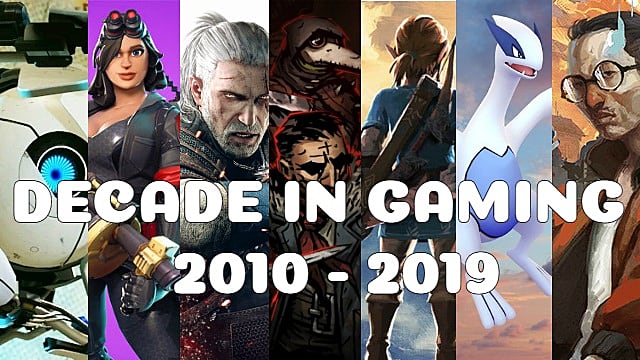
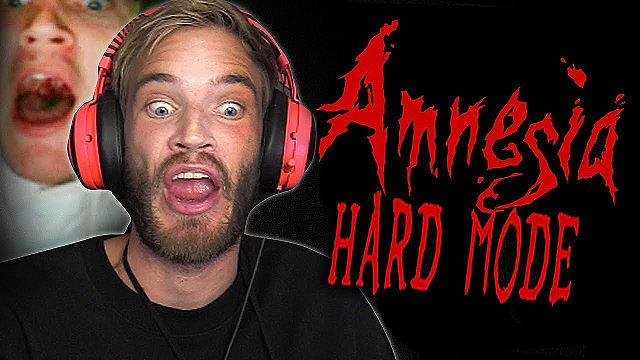
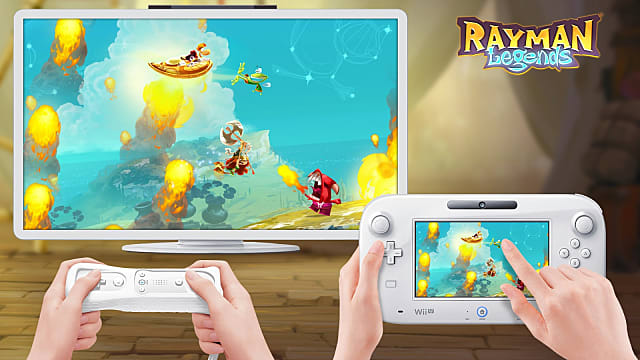
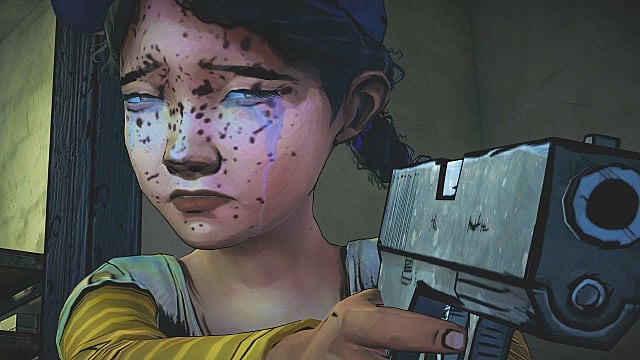
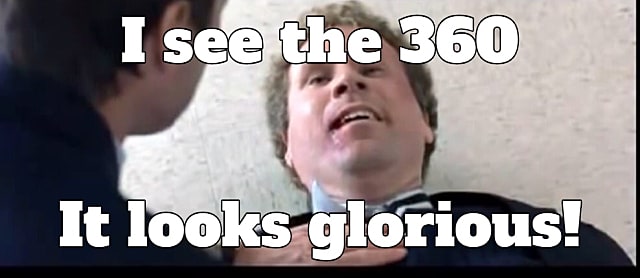
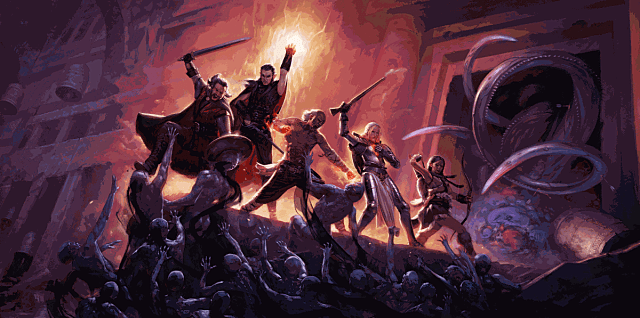
![]()

